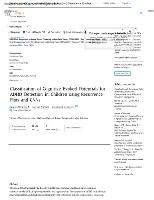Abstract
Attention-deficit/hyperactivity disorder (ADHD) is a common childhood-onset condition characterized by difficulty paying attention and hyperactivity. The diagnosis of ADHD is made from psychological tests and electroencephalography (EEG). However, patient cooperation is necessary, which is a challenge with ADHD children. This work proposes a method for classification of ADHD and control cases from cognitive event-related potentials using recurrence plots and deep learning. A total of 44 children were included in this study (22 children with ADHD and 22 case controls). The signals were processed by a high-pass filter to eliminate DC components, wavelets transform with six decomposition levels, and synchronized averaging for each of the six channels (F3, AF3, F4, AF4, F7 and F8). Subsequently, the recurrence plot of each of the processed signals was obtained and used as inputs for two convolutional neural networks (CNN). The proposed models showed accuracies of 69.44% and 77,78%. © 2021 IEEE














